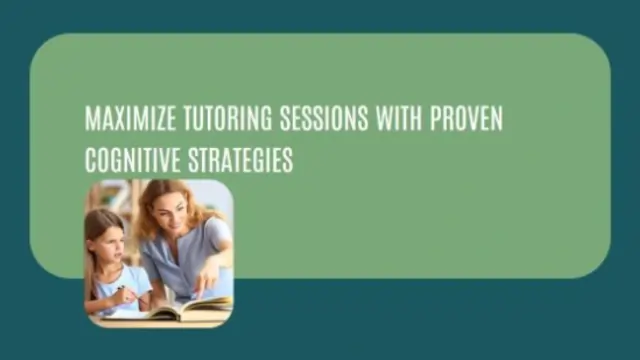
Science of Learning: Applying Cognitive Strategies in Tutoring
Education is a transformative process that empowers individuals to acquire knowledge, develop skills, and achieve their full potential
Within the realm of education, tutoring plays a crucial role in providing personalized and targeted support to learners. While tutoring sessions have traditionally focused on subject matter expertise, the science of learning has shed light on various cognitive strategies that can significantly enhance the effectiveness of tutoring. By integrating these evidence-based techniques into tutoring sessions, educators can optimize the learning experience and facilitate long-term retention and comprehension. In this blog post, we will explore some key cognitive strategies and discuss how they can be applied in tutoring sessions to maximize learning outcomes.
1. Retrieval Practice:
Strengthening Memory Through Active Recall This strategy has been shown to promote long-term retention and enhance learning. Tutors can incorporate retrieval practice by asking learners to retrieve the information they have previously learned. For example, they can start a session with a brief review quiz or engage in periodic questioning throughout the session. By actively retrieving knowledge, learners reinforce their understanding, identify gaps in their comprehension, and solidify their memory of the material.
2. Spaced Repetition:
Optimizing Learning through Distributed Practice Spaced repetition is the practice of reviewing information at gradually increasing intervals over time. This technique takes advantage of the spacing effect, which suggests that spacing out learning sessions leads to better retention compared to massed practice. Tutors can leverage spaced repetition by designing tutoring sessions that revisit previously covered topics at strategic intervals. This approach helps learners reinforce their knowledge, combat the forgetting curve, and promote long-term mastery of the subject matter.
3. Metacognition: Developing Self-Regulated Learners
Metacognition refers to the ability to think about one's thinking and regulate one's learning processes. By fostering metacognitive skills in tutoring sessions, tutors empower learners to become self-regulated learners who can monitor their own understanding, identify areas of difficulty, and implement appropriate learning strategies. Tutors can facilitate metacognition by encouraging learners to reflect on their learning experiences, set goals, plan their study routines, and evaluate their progress. This metacognitive awareness enhances learners' ability to adapt their learning strategies to suit their individual needs, leading to more effective learning outcomes.
4. Elaboration:
Connecting New Knowledge to Existing Mental Schema Elaboration involves making connections between new information and existing mental schema. By encouraging learners to elaborate on the material, tutors can help them deepen their understanding and create meaningful associations. Tutors can facilitate elaboration by asking open-ended questions, encouraging learners to explain concepts in their own words, and relating new information to real-life examples or personal experiences. This cognitive strategy promotes higher-order thinking skills, critical analysis, and the creation of robust mental models.
5. Scaffolding:
Providing Support and Gradually Fading Assistance Scaffolding is a teaching technique that involves providing temporary support to learners as they tackle challenging tasks, gradually reducing assistance as their competence improves. Tutors can apply scaffolding principles by breaking complex problems into smaller, manageable steps, modeling problem-solving strategies, and providing hints or cues to guide learners. As learners gain confidence and proficiency, tutors can gradually withdraw support, allowing them to independently apply their knowledge and skills. Scaffolding nurtures learners' confidence, promotes autonomy, and helps them build a solid foundation for future learning.
Conclusion
The science of learning has uncovered valuable insights into how individuals acquire, retain, and apply knowledge. By incorporating evidence-based cognitive strategies into tutoring sessions, educators can create an optimal learning environment that promotes deep understanding, long-term retention, and metacognitive development. Retrieval practice, spaced repetition, metacognition, elaboration, and scaffolding are just a few examples of cognitive strategies that tutors can employ to enhance the effectiveness of their sessions. By leveraging these strategies, tutors can empower learners to become active participants in their own education, fostering a love for learning that extends far beyond tutoring sessions.
Last update: 2023-07-27 08:21:32
 Clenta
Clenta










